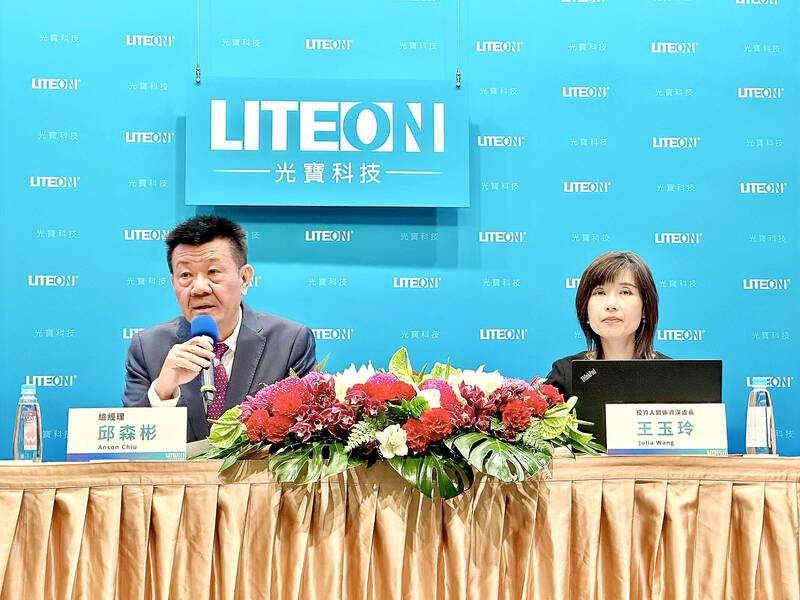Electronic components supplier Lite-On Technology Corp (光寶科技) yesterday reported weaker-than-expected earnings per share (EPS) of NT$1.51 for last year’s October-to-December quarter due to declining sales and slowing gross margin improvement.
However, last year’s total EPS was the highest in the company’s history at NT$6.36, compared with NT$6.19 the previous year, as gross margin hit a record high of 22 percent despite a retreat in annual sales.
As a result, the company’s board of directors approved a plan to distribute a cash dividend of NT$2.5 per share for the fourth quarter of last year, the company said.

Photo: Fang Wei-chieh, Taipei Times
Including a cash dividend of NT$2 per share it distributed for the first half of last year, Lite-On’s total cash dividends for last year would reach NT$4.5 per share with a 70.75 percent payout ratio if the company receives a green light from shareholders at its annual general meeting on May 27, it said.
This quarter, the company’s sales would drop sequentially due to clients’ inventory adjustments dragging down its information technology and consumer electronics business, Lite-On president Anson Chiu (邱森彬) said at the conference.
The information technology and consumer electronics segment contributed 46 percent of the company’s sales of NT$36.91 billion (US$1.17 billion) last quarter, ahead of the cloud computing and artificial intelligence (AI) of things segment’s 35 percent and the optoelectronics segment’s 19 percent, the document showed.
The company expects business to resume growth from the second quarter, driven by contributions from sales of opto-semiconductors, automotive electronics and power supplies for AI servers, Chiu said.
Lite-On is targeted to achieve double-digit percentage growth in annual sales for the next three years beginning this year, he added.
The company is paying growing attention to AI applications with larger exposure to server power solutions, keyboards and handset opto-semiconductors this year, Chiu said.
Contributions from those AI-related products are expected to account for 7 to 8 percent of the company’s sales this year and reach double-digit figures next year, compared with nearly 5 percent last year, he said.
The company’s reported earnings showed it posted a fourth-quarter net profit of NT$3.46 billion, down 24 percent from the previous quarter and also down 10 percent from the previous year, as sales in the quarter decreased 8 percent sequentially and 14 percent annually to NT$36.91 billion.
Yuanta Securities Investment Consulting Co (元大投顧) had expected the company to post fourth-quarter sales of NT$40.92 billion, with net profit of NT$4.38 billion, or EPS of NT$1.91.
That brought last year’s total net profit to NT$14.57 billion, up 3 percent from 2022, while full-year sales fell 14 percent annually to NT$148.33 billion, Lite-On said.

Taiwan Semiconductor Manufacturing Co (TSMC, 台積電) last week recorded an increase in the number of shareholders to the highest in almost eight months, despite its share price falling 3.38 percent from the previous week, Taiwan Stock Exchange data released on Saturday showed. As of Friday, TSMC had 1.88 million shareholders, the most since the week of April 25 and an increase of 31,870 from the previous week, the data showed. The number of shareholders jumped despite a drop of NT$50 (US$1.59), or 3.38 percent, in TSMC’s share price from a week earlier to NT$1,430, as investors took profits from their earlier gains

In a high-security Shenzhen laboratory, Chinese scientists have built what Washington has spent years trying to prevent: a prototype of a machine capable of producing the cutting-edge semiconductor chips that power artificial intelligence (AI), smartphones and weapons central to Western military dominance, Reuters has learned. Completed early this year and undergoing testing, the prototype fills nearly an entire factory floor. It was built by a team of former engineers from Dutch semiconductor giant ASML who reverse-engineered the company’s extreme ultraviolet lithography (EUV) machines, according to two people with knowledge of the project. EUV machines sit at the heart of a technological Cold

TAIWAN VALUE CHAIN: Foxtron is to fully own Luxgen following the transaction and it plans to launch a new electric model, the Foxtron Bria, in Taiwan next year Yulon Motor Co (裕隆汽車) yesterday said that its board of directors approved the disposal of its electric vehicle (EV) unit, Luxgen Motor Co (納智捷汽車), to Foxtron Vehicle Technologies Co (鴻華先進) for NT$787.6 million (US$24.98 million). Foxtron, a half-half joint venture between Yulon affiliate Hua-Chuang Automobile Information Technical Center Co (華創車電) and Hon Hai Precision Industry Co (鴻海精密), expects to wrap up the deal in the first quarter of next year. Foxtron would fully own Luxgen following the transaction, including five car distributing companies, outlets and all employees. The deal is subject to the approval of the Fair Trade Commission, Foxtron said. “Foxtron will be

INFLATION CONSIDERATION: The BOJ governor said that it would ‘keep making appropriate decisions’ and would adjust depending on the economy and prices The Bank of Japan (BOJ) yesterday raised its benchmark interest rate to the highest in 30 years and said more increases are in the pipeline if conditions allow, in a sign of growing conviction that it can attain the stable inflation target it has pursued for more than a decade. Bank of Japan Governor Kazuo Ueda’s policy board increased the rate by 0.2 percentage points to 0.75 percent, in a unanimous decision, the bank said in a statement. The central bank cited the rising likelihood of its economic outlook being realized. The rate change was expected by all 50 economists surveyed by Bloomberg. The